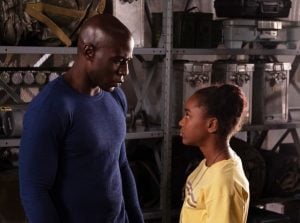
“What Fanning wants is for you to believe the worst about yourself.”
As the march towards the end moves inexorably closer, Amy and Wolgast, separated by circumstance, must come to terms with their guilt as Lear and Sykes race to save Elizabeth from the mutating virus. All the while, Fanning patiently waits, still needing one more viral to join him and the others to become the Twelve and usher in a new world; one where the virus of humanity is expunged.
Though protagonists in each of the myriad of stories to be told are created through different experiences, a common trait they often share is guilt. While the reasoning behind this varies, more often than not, the protagonist, through their actions—perceived or otherwise—has lost someone close to them. Therefore, when we catch up to their story, said protagonist may be running from that guilt or overcompensating in an attempt to make amends for their failure. And while “You Are Like the Sun” separates Amy and Wolgast for an extended period of time, both have to deal with the monstrous guilt weighing them down.

We’ve known for some time that Wolgast had lost his daughter Eva to a tragedy, but it wasn’t until this week that the story plays out before our eyes. Interspersed between him and Lila’s desperation to escape their government captors and get back to Amy, the past plays out of the once-happy family and how even an inadvertent action can cause a cascade of misery. It’s not just that they lose Eva, a loss which drives a wedge between them but Wolgast, in an effort to make it right, kills the man responsible (a lowlife who shot her as he tried robbing a convenience store) loses himself. Not only does this split him and Lila, it puts him on a path where—in his own words—he becomes a monster that convinces the death row inmates to sign their lives away in order for them to become monsters as well. Wolgast’s story is a testament to the lies we may tell ourselves or the truths we refuse to acknowledge, thus preventing ourselves from the healing we truly need to move on.

Amy’s tale is a bit different. In the series premiere, Wolgast comes across her not long after she discovers her own mother’s death. But it’s not until Carter pays her a visit and forces Amy to examine the truth of what she feels that her own guilt is put on display. Like many children, Amy has a tantrum, one where she makes her mother cry and her mother’s ensuing fate is—in Amy’s mind—a direct correlation to the spiteful last words she threw at her mother. Though harsh in his words, Carter forces her to face this trauma so that, instead of it continually darkening her soul to the point where it overshadows the light inside her and thus allowing Fanning the fuel to break her down, Amy must reconcile with the truth. Yes, it does help that Carter’s reminder that she can go anywhere finds Amy with her mother, a final goodbye on the psychic plane if you will. But even without that, having an adult break down the truth with her pulls Amy from that slowly growing pit of despair. Accepting the truth gives Amy the strength to face Fanning when he shows up in her mindscape…and it will be vital as the inevitable catastrophe comes to a head.
Outside of our two main protagonists, changes at Project Noah solidify the stupidity of Guilder and those in power. Despite the dangers of what they’ve seen in addition to the warnings from Sykes and the now-converted Richards, Guilder and co believe that stepping up security will provide them with enough breathing room to keep the virals at bay while capitalizing on the potential benefits (and lack of visible detractions) displayed by Amy’s progress. When the monetary expenditures have hit a point like they have with Project Noah, it’s natural for bureaucrats to want to salvage something for the price tag but there are times where one has to cut the cord lest the entire ship gets dragged down into the much.
Finally, we are left with Fanning. After Winston’s loss, they need another body for his master plan to succeed. He tells the increasingly skeptical Babcock that they must be Twelve and once Elizabeth (Lear’s wife) says yes, the time for action to be upon them. But unlike Carter, when faced with death, Elizabeth doesn’t take Fanning’s offer. Instead, she chooses to die in Lear’s arms. It leaves him one person short of his viral quorum, though, in the final seconds, he pays a visit to Amy. Whether it’s his final desperate attempt to bring her to his side or eliminate her as a viable threat remains to be seen.
![]()
